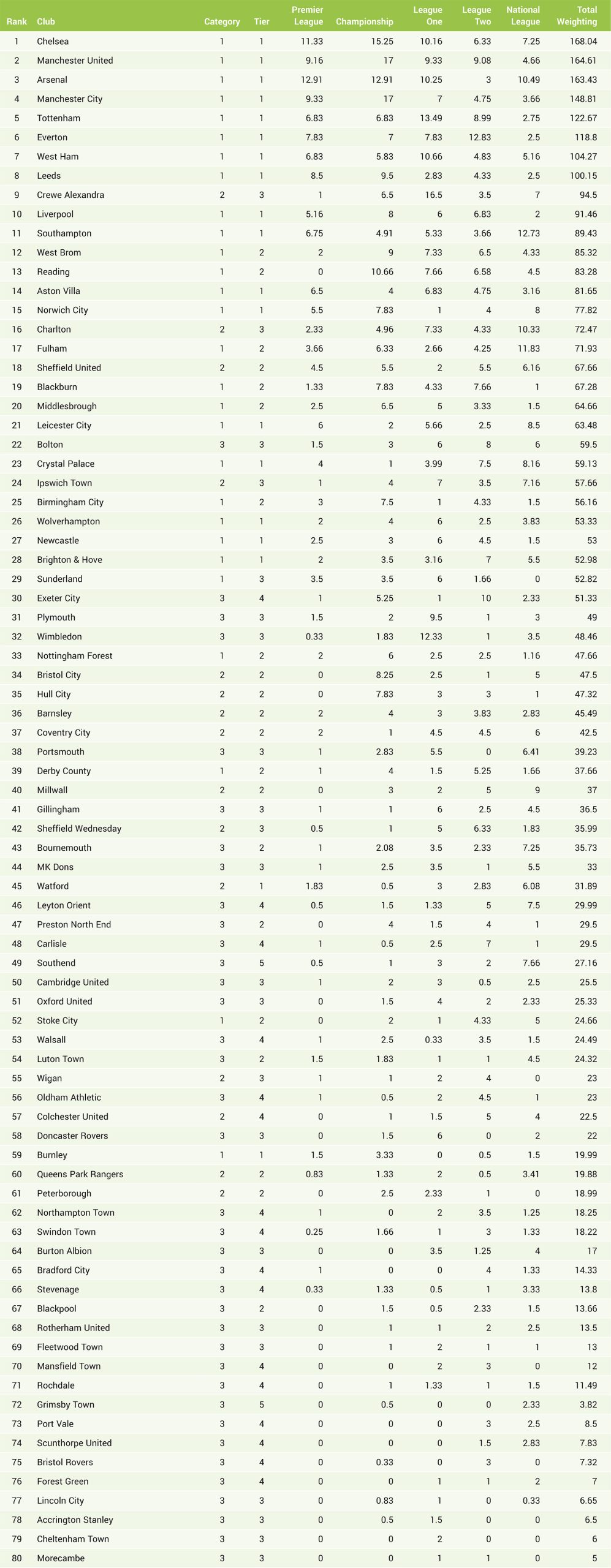
Academy Productivity Rankings 2021/22: Chelsea top for first time
Written by
Simon Austin
September 22, 2022
Chelsea have topped Training Ground Guru’s Academy Productivity Rankings for the first time ever.
The Blues Academy was the most productive in the country, with Manchester United second and Arsenal third. This marks the first time since the inception of the rankings in 2016/17 that Manchester United have not been top.
The rankings are the only publicly-available resource of their kind and rank Academies from Categories One to Three based on the number of England-qualified graduates who made at least one league appearance in the Premier League, Football League or National League in the 2021/22 season.
Chelsea have risen from third last year to take top spot and the gap between the leading three is the smallest it has ever been.
Neil Bath, Chelsea’s Head of Youth Development, said: “We are delighted to hear the news of scoring top in the Training Ground Guru Productivity Ratings.
“While we acknowledge that there are many other varied objectives in running a successful youth development programme, of course it is the ultimate goal to develop players that play and make careers in the senior game.
“As we all know, players progress at different ages and in different environments so we have worked hard over many years to create a development culture at Chelsea that allows that to happen.
“It is therefore incredibly pleasing to see us top these ratings and it is recognition for the Academy and the club as a whole. This is something I know our new ownership will only want to build upon in the years to come.”
Manchester City are notable risers to fourth place. The Academy, led by Jason Wilcox, were 14th in our first rankings, in 2016/17, and seventh last season. Now they are closing in on the top three. Perhaps most impressive of all, however, are Crewe Alexandra. The club, now in League Two, are the only club from outside the Premier League in the top 10 and the only one from outside Category One in the top 15.
The other new entrants in the top 10 are Leeds United, who have jumped from 16th to eighth. If judged purely on the number of Premier League players produced, they would be fifth.
Southampton have dropped from fifth to 11th but, as ever, some context is required. Since launching their B team in 2020/21, the club have moved away from the loans system and focused on developing players ‘in-house’ instead.
As last year, Liverpool are 10th, but a significant proportion of their players, such as Harvey Elliott, Kaide Gordon and Rhian Brewster, started at other Academies, so the points were split.
Another club worthy of mention is Charlton Athletic, in 16th (down from 14th in 2020/21), who are the second most productive Category Two Academy in the country after Crewe; and Sheffield United, also Category Two, who are 18th (down from 13th).
The most productive Category Three Academy is Bolton, in 22nd. They have endured difficult times off the pitch in recent seasons, prior to their takeover in August 2019, but place above a host of Premier League and Category One clubs in our rankings.
Once again, we have only included Category One, Two and Three clubs in these rankings, but two sides outside of these classifications are worthy of mention.
Huddersfield Town dropped from Category Two to Four in 2017, meaning they now only run teams from Under-18s. The Terriers would have placed 26th in our rankings, down from 26th in 2020/21, with an overall score of 55.48.
Brentford, who dropped out of the EPPP system in 2016 but who have now re-entered, would have ranked 64th for the latest edition of the rankings, down from 59th in 2020/21. Their overall score was 17.72.

METHODOLOGY
Josh Schneider-Weiler: This is the fourth edition of Training Ground Guru’s Academy Productivity Rankings and I have followed the same methodology as in previous years.
A list was compiled of male English players (ie players eligible in the 2021/22 season to play for the England men’s national team) who played in at least one match for any team in the top five English leagues, based on data from the www.fbref.com website.
Information on the Academy, or Academies, attended by each English player who had made at least one league appearance was then collated and cross-referenced from information in Wikipedia, club biographies, news sources and www.transfermarkt.co.uk.
An Academy, Centre of Excellence or other club training structure was counted as having contributed to a player’s development if he was in attendance there at any point up to the age of 18.
As in previous editions, a weighting is applied according to the league in which the player appeared, with more points given if they played in the Premier League and so on.
If they played in more than one Academy (as many did) then the points are split evenly between them. There are players who may have been produced by these Academies who, for various reasons, may not be included in the research.
Players who are not listed as English on www.fbref.com were not included. So players like Wilfried Zaha, who was developed by Crystal Palace but is listed as from the Ivory Coast, were excluded.
This year we have decided to omit Welsh clubs from the rankings, even though they are part of the Elite Player Performance Plan. This is because we are only counting English players and this is a tremendous disadvantage for teams like Swansea City and Cardiff City, for obvious reasons.
Players who were signed or on loan in other countries did not count towards the rankings either.
This article is for TGG Members
To view this full article (and all others) you need to be a TGG Member. Join up today and get access to:
- Masterclasses & Online Conferences
- Full Academy Productivity Rankings & analysis
- Club Directory with 96 clubs & 1,000+ staff profiles
- Personal Profile Builder to showcase yourself
- TGG Live 2024 & 2025 presentations
